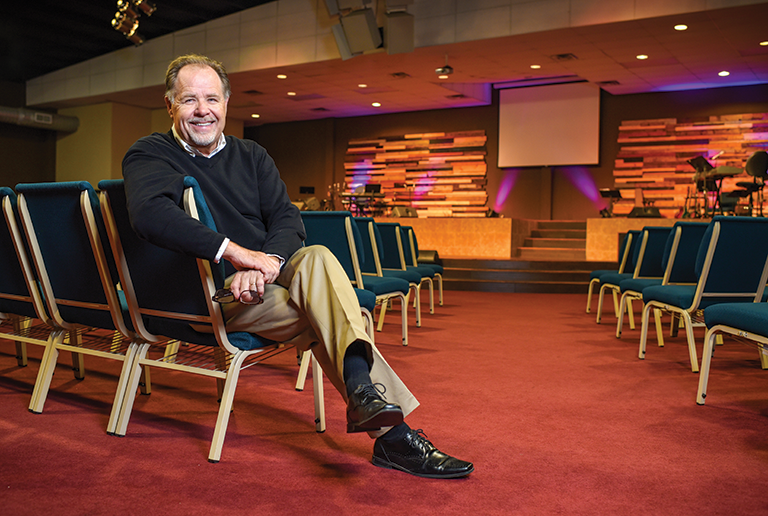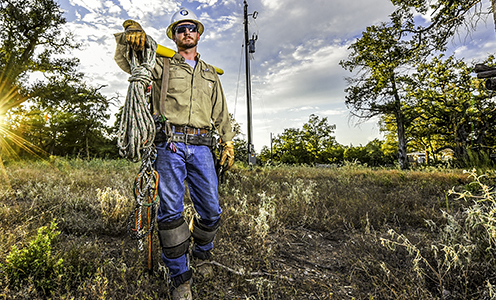Congregants stand during services on a recent Sunday at the Family Worship Center, located between Bastrop and Elgin. Large open areas such as a church’s sanctuary can use a lot of electricity in a short time, creating energy efficiency challenges. (Sarah Beal photo)
By Ed Crowell
Pastor Jerry Edmon believes a geographical miracle is at work filling up his church for the weekly Sunday service.
“We’re not close to anything,” he said of the non-denominational Family Worship Center located midway between Elgin and Bastrop on sparsely populated FM 1704.
“It’s kind of a miracle. People are driving in from all over — Buda, North Austin, Smithville, Taylor.”

Edmon, of course, wants his congregation to be comfortable when they fill the seats in the sanctuary on Sunday mornings and in the activities building next door for Wednesday evening supper and services. That means making sure inside temperatures are right and the lighting is good.
The church, a longtime commercial member of Bluebonnet Electric Cooperative, relies on electric power (except for a propane-fueled kitchen stove). Edmon and his small staff say they try to follow energy-saving tips from the co-op and other sources to keep their electric bills down.
The Family Worship Center, like many churches with big, open spaces that get used just a few hours a week, is difficult to heat and cool efficiently. The lights generally get turned on all at the same time, and they stay on at full power for services.
“We’ve learned some lessons in the past few years” about managing electric usage, Edmon said. The current sanctuary was built in 2001, and Edmon became senior pastor about 12 years ago.
To help the church get a tighter grip on its energy consumption, Bluebonnet recently offered the services of an independent energy auditor. The assessment was done without cost to the church so other churches that are co-op members — or any business with a large space that is used occasionally — could benefit from the energy- and money-saving tips provided to Edmon.
The timing was right, as the church plans to expand its facilities later this year to accommodate a growing congregation.
Remodeling and an addition will allow up to 900 movable seats in the sanctuary. About 500 people are members of the church now.
Despite consistent growth of the Family Worship Center since Edmon arrived in 1993 from Oklahoma, he said he is not trying to build a megachurch. “I don’t trust churches that grow too fast,” he said.
He said he doesn’t want to lose any of the emphasis on families that is the church’s mainstay. Keeping to a single Sunday service is important to him because people lose their connection with one another if they don’t all attend church together, he said.
“The motto of our church is Building Strong Families. That’s the thrust for everything that we do here,” said Edmon, the 61-year-old father of three daughters. He and his wife, Angie, a member of the Elgin Independent School District board, also have a young grandson.
“Health is one of our core values. And by that I mean spiritually healthy, financially healthy and socially healthy,” he said. “I want to see these kids grow up with well-balanced lives.”
He said the range of ages and generations at the church helps achieve those goals. “We have people up in their 90s down to infants.”
Edmon’s father-in-law, Irvin McCorkle, was the senior pastor before Edmon took over. McCorkle had started a Church of God on the property in 1988. Edmon renamed it to put family worship at the forefront of a Bible-centered, non-denominational church.
“We’re a Heinz 57 variety. We have people who grew up Catholic or Baptist or Episcopalian,” he said, noting that people used to be born into one faith and died that way, but now many people try different churches.
Auditing church’s energy use
On a Wednesday afternoon in late January, before families gathered for a light supper, Bible talk and children’s faith sessions, the pastor opened his church’s doors to energy efficiency consultant Jerry Golden of Golden Energy Services. The heat and some of the lights in the low-slung brick sanctuary had been turned on.
Golden, whose business is in Clifton, asked questions about the church’s power needs and habits. He noted that the building is “efficient by design, largely because it has few windows.” The foyer is the only area where sunlight streams in.
Edmon showed Golden the 10 overhead lights in the back of the large auditorium that were replaced a year ago with LED bulbs on a dimmer switch. That was fine, Golden said. Where dimmers are not needed and hours of use are limited, compact fluorescent (CFL) bulbs should be considered – as long as they are available. Those bulbs are being phased out by the industry, but still are still available. They cost less and are nearly as efficient as most LEDs.
The incandescent lights that shine on the two-level stage where Edmon preaches and musicians play should be replaced, Golden said. Using 13-watt CFLs would provide as much light as 65- to 75-watt incandescents and pay for themselves in energy savings within the first couple of months, he added. In the E.C. Smith activities hall next door, a dozen 65-watt incandescent floodlights at the front of the building could be replaced with CFLs at a cost of $20, and the church would save $40 to $50 a year.
Golden, who has worked as a consultant with Bluebonnet for more than a decade, went outside to look at the array of 5-ton air-conditioning units on the side and back of the building. The units are aging and may soon need maintenance, he said. Some were manufactured years before the church was built in 2001, but Edmon was unsure if they had been moved from the previous building. Golden recommended that the church wait until a unit’s compressor fails before replacing it with a new, more efficient unit.
The programmable thermostats in the church should be set to slowly increase cooling or heating from the time the church is empty to when parishioners arrive, Golden said. “You can get to the right operating temperature in a reasonable time and save energy by not turning everything on at the same time.” When the building is not occupied, Golden recommended setting the thermostats to 85 degrees in summer and 55 degrees in winter.
Large commercial members, including many churches, pay not just for the amount of power they use but also for their “demand,” which is the largest amount of power used during any 30-minute period in the monthly billing cycle. Because all the church’s power is used on Sundays and Wednesdays (except for occasional weddings or funerals), that “demand” portion – which means a higher bill if the church exceeds a certain amount of power use — is very important. (See Energy Demand story, p. 21).
Edmon said that once he has a solid plan for a 4,500-square-foot expansion of the sanctuary, “I’ll get with Bluebonnet for suggestions.”
A written audit report will be given to the church after Golden examines the church’s energy use history and the power billing rates it has been paying. Last year, the church’s electric bills averaged $1,683 a month, with the highest for July at $2,334 and the lowest for May at $1,296.
Other churches that are Bluebonnet members also pay attention to energy-saving measures.
At St. Stanislaus Catholic Church in Chappell Hill, for example, several steps were taken two years ago to lower power bills. New heating and air-conditioning units and a programmable thermostat were installed. “We had a horrible system under the floor,” said Joanie Correll, secretary at the church, which was built in 1924.
Also, clear plastic shields were installed on the stained-glass windows to reduce the heat coming through. Energy-saving bulbs replaced old lighting. “We’re modernized very well now, and our large parish hall is next,” she said.
Rosanky Baptist Church, which was founded in 1916, incorporated a more efficient heating and air-conditioning system after moving into a new building in 2008. “We’re well insulated, and we keep a curtain closed over our one big window in the front of the church,” said Senior Pastor John Abraham. When the church is occupied, the thermostat is set to 75 degrees during the day and 68 at night, he said, and he usually turns off the system when the church is empty. “I’ve informed our people not to change it because we’re limited in funding.”
Powering up
Back at the Family Worship Center outside Elgin on a cold winter night, the activities hall was warm and cozy. Families had gathered for the Wednesday “Power Up” service, a midweek boost members get from fellowship and faith.
Dozens of people of all ages lined up for bowls of hot vegetable soup and cornbread prepared by two members of the congregation. Some of the families had begun the evening playing pool on three billiard tables.
Charles and Michelle McInnis, both state employees in Austin, said they looked for a church soon after moving to Elgin 10 years ago. He grew up Baptist and she Methodist, but they were open to any church rooted in the Bible.
At the Family Worship Center, “What we noticed right away was the friendliness. Some other places you have to go three or four Sundays in a row before someone recognizes you are there. That’s not the case here where everyone is so accepting,” Charles said.
“The leadership is great, and the church as a whole is a really good example of what family life looks like,” he added.
McInnis said his 8-year-old son, C.J., and 18-year-old daughter, Jordan, have many friends at the church. Jordan is also a singer on the praise team.
After the meal, children and teenagers headed upstairs for music, games and religious lessons.
In the high school group’s room, 15 young people joined Jordan singing along with a Christian music video. The darkened room was decorated like a disco.
Next door, the middle school group answered a group leader’s question about what they would change in their lives if they could. “Spend less,” one boy said. “Stop fighting with my sister,” another said.
Downstairs, the adults sat at big round tables to hear Edmon talk about a Bible verse and then family matters. He pulled out his cell phone as a prop and questioned the pressure to answer every call immediately.
“It’s supposed to be such a time-saving device, yet we have less time.… God didn’t overschedule your life; you did…. Kids can’t do every sport and every activity from noon ‘til night.… Take time to sit together and read and talk,” he said.
The Family Worship Center nonetheless presents a modern face with digital communications to reach families on Facebook and Twitter. Videos of Edmon’s talks and sermons are posted on the church’s website along with parishioners’ feedback. Clips show events such as the church’s annual Backpack Outreach where 500 free backpacks loaded with supplies are handed out to Elgin public school students.
It’s all part of the well-rounded worldly and spiritual life that Edmon tries to build.
“I love what I’m doing,” he said. “There is something so rich about being there for people through every stage of their lives.”





